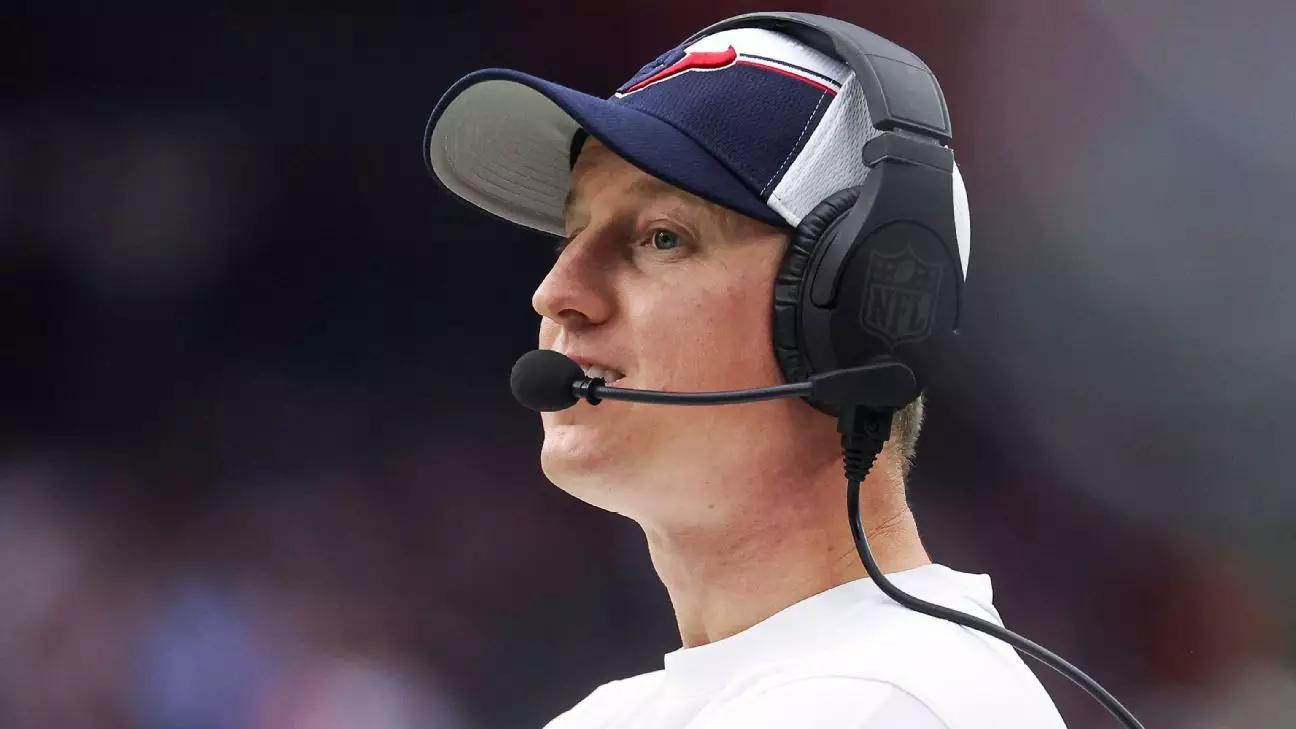In a bold decision indicative of the Houston Texans’ intentions to improve their offensive output, the franchise has part ways with offensive coordinator Bobby Slowik after a two-year tenure. Along with Slowik, the team has dismissed offensive line coach Chris Strausser and assistant offensive line coach Cole Popovich, as confirmed by sources close to ESPN. While a playoff berth signifies a successful season on some levels – as evidenced by the Texans winning the AFC South with a 10-7 record and advancing to the divisional round – the underlying performance of the offensive unit raised significant concerns that ultimately led to this shake-up.
The Texans’ head coach, DeMeco Ryans, had previously stated his desire to evaluate the coaching staff following a season fraught with inconsistency. His assessment of Slowik’s performance was guarded at best. Although he acknowledged some level of growth in the offense throughout the year, his comments lacked enthusiasm, leaving open the possibility that the Texans’ leadership recognized the fundamental issues plaguing the offensive strategy.
In the realm of professional football, maintaining momentum is crucial. However, the 2024 season for the Texans’ offense offers evidence of stagnation, despite high expectations. Ranked 18th in scoring with just 22.1 points per game and placed 16th in total offensive yards with an average of 329 per game, inconsistencies were rampant. The most alarming statistic revolves around quarterback C.J. Stroud, who faced tremendous pressure throughout the season. He was sacked 52 times, placing him near the top of the league in terms of quarterback hits — not a recipe for success.
What compounded the situation was Stroud’s regression in his second year. After his rookie performance, which was among the best statistically, expectations soared for the young signal-caller. However, he could only muster 3,727 passing yards and 20 touchdowns, lower than his previous season’s impressive total, despite having a cast that included Pro Bowl talent like left tackle Laremy Tunsil and running back Joe Mixon. This drop-off begs the question: What went wrong in the Texans’ offensive game plan?
Poor Execution in Critical Situations
One glaring issue for the Texans was their execution during crucial moments of the game. Despite having the necessary talent to succeed, the offense found itself stagnating, particularly in the second half of games. Averaging a league-worst 7.5 points in the second half illustrates a systemic failure to adapt post-halftime. Between Weeks 7 and 12, the inability even to score an offensive touchdown exemplified profound struggles, with an offense that rarely found rhythm or sustained momentum over extended periods.
Third-down and red-zone conversions were equally uninspiring, with the Texans ranking 17th in third-down efficiency and a disastrous 28th in red-zone scoring. This inability to convert opportunities into points not only affected their win-loss record but also amplified concerns regarding the offensive coaching staff’s effectiveness. Ryans’ assertion that the offensive strategies need improvement should serve as a wake-up call for the entire organization.
The Texans’ decision to overhaul their offensive coaching staff is a clear signal of intent moving forward. While Slowik was an initial choice by Ryans after their time together with the San Francisco 49ers, the results simply did not align with the team’s aspirations. To ascend from mediocrity, it is imperative that the Texans find a new coordinator who can both maximize existing talent and effectively instill a disciplined offensive mindset.
With the upcoming draft and free agency poised to present new opportunities for bolstering the roster, the Texans have a chance to reshape their offense. The prospect of acquiring fresh talent, coupled with strategic shifts in coaching, could herald a new era of success. The upcoming decisions present both a challenge and an opportunity: to not only evaluate the previous shortcomings but to build upon them and rise to greater heights. Only time will tell if this move was the catalyst for a revamped Houston Texans offense poised for resurgence.

